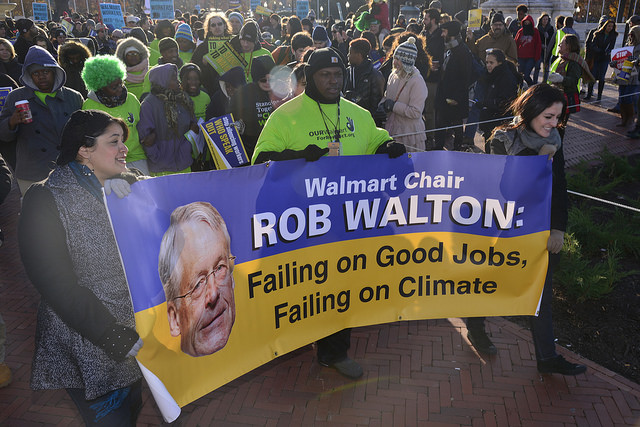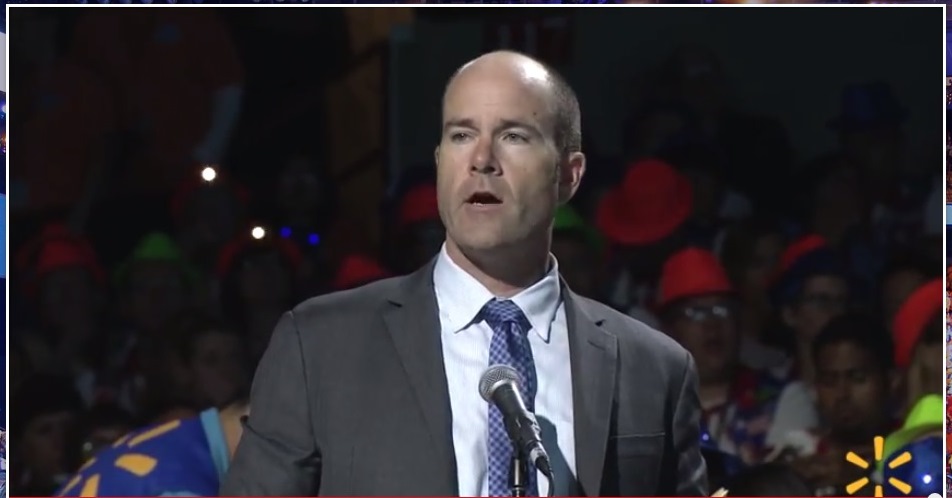Brune to Walmart Executives and Shareholders: Living Wages, Living Planet Hitched Together
Last Friday Sierra Club Executive Director Michael Brune asked Walmart executives and shareholders to exercise real leadership on climate by
- setting a goal to reduce super-sized marine shipping emissions that are disrupting our climate and
- setting a deadline of 2020 to meet its commitment to shift its operations to 100 percent clean energy.
At the same time, Brune, presenting the resolution of longtime Walmart “associate” and Our Walmart member Mary Pat Tifft, called on Walmart to raise the wages of all its associates to $15 an hour, and to make peace with the courageous associates who are part of Our WalMart by reopening the five stores that it closed after workers in them took action to stand up for their rights, and by reinstating those workers with back pay and benefits.
Brune’s foray into the frenzied sports-stadium fray of the shareholder meeting on behalf of the “visiting team,” Walmart’s workers, provided a powerful example of the Club’s contemporary commitment to building a powerful, diverse, equitable and inclusive “movement of movements.” It also reflected the foundational insight of John Muir, who famously observed, “When we try to pick out anything by itself, we find it hitched to everything else in the Universe.”
Today, we can’t pick out the transition to the 100 percent clean energy economy from the struggle for economic justice for working people. In the case of Walmart, the business model of the world’s largest and most powerful company prioritizes low prices and high profits over the quality of the human and natural environments. It’s really impossible to separate the climate impact of its metastasizing marine shipping emissions, the result of a decision to premise growth and profits on low cost manufacturing overseas, from the decision to build that growth on the backs of the public by paying workers so little they have to rely on public assistance.
 Brune dug into the intrinsic interconnectedness of the economic and climate justice fights when he spoke to fast food workers at the Fight for $15 national day of action on April 15:
Brune dug into the intrinsic interconnectedness of the economic and climate justice fights when he spoke to fast food workers at the Fight for $15 national day of action on April 15:
You all are taking on the same corporate business model that is threatening our planet. The same big box and fast food stores that pay so little that their own workers can’t afford to eat the food they sell are running global supply chains that are emitting carbon pollution that’s destroying our climate.
Here’s what we’re saying to the Walmarts: You have to change your business models so that we can live. We want living wages and a living planet! And for us to get there, here’s what you need to do: You need to invest in people by paying your employees enough to live on. And you need to invest in communities by sourcing your products locally.
Walmart can no longer dump carbon dioxide into the atmosphere to ship a bunch of stuff from across the ocean just so they can avoid paying people here enough to live. That’s a death economy. We want a life economy. For that, we need living wages on a living planet, powered by 100 percent clean energy. And you are the ones who are getting us there.
As much as Brune deserves credit for amplifying the Walmart workers’ courageous struggle, what;s even more impressive is the sustained commitment those workers have shown to the struggle to combat climate disruption, and their consciousness of the strategic importance of their efforts as the workforce of one of the world’s leading global climate polluters.
Walmart has announced a decision to increase its purchases of products made in the U.S. If it keeps that promise, the growth of imports will decline, emissions will decline, and the U.S. will add jobs. As Brune said, “what’s not to like about that?” But Walmart has a history of falling short of its promises to become a more socially responsible company. It was 2005 when Walmart announced its commitment to shift U.S. operations to 100 percent clean energy. Nearly a decade later, according to a study by the Institute for Local Self-Reliance, Walmart had barely inched its reliance on renewables up to three percent.
Yet, four hours after Brune joined climate activist Bill McKibben in a telepresser last Black Friday criticizing Walmart’s slow progress on renewables, the company announced a decision to install solar on an additional 400 stores over the next four years, and since then, the company has promised to “driv[e] the production or procurement of seven billion kWh of renewable energy globally by Dec. 31, 2020.” Similarly, after Walmart workers, who have been organizing for years, struck the company, also last Black Friday, and kept the pressure on in the following months, Walmart agreed to raise wages, first for half a million associates (hourly workers) and then for a hundred thousand managers.
Of course these steps are not enough, and it will require redoubled pressure to make the world’s largest retailer the company it claims to be. The point is that one has to be in serious denial to claim that the progress that has been achieved is the result of anything other than the strategic and no doubt uncomfortable (for Walmart’s executives and apologists) concerted pressure of social movements. It is also hard to deny that the workers and the environmentalists are accomplishing a lot more by hanging together than they would have by succumbing to Walmart’s efforts to divide their movements, in part via a sophisticated greenwashing effort. Taking the tempting bait offered by Walmart’s corporate largesse would likely result in a reaffirmation of Ben Franklin’s wisdom that these movements would “assuredly all hang separately.”
In short, Brune’s advocacy for Walmart workers, and their advocacy of stronger action on climate and clean energy by their employer, suggests that the strategic alliance between the Sierra Club and Walmart’s workers is a recipe for success. Not only are the economic and climate justice movements substantively inseparable, they’re simply more powerful together.
Dean Hubbard is the director of the Sierra Club’s Labor Program








Follow Us!